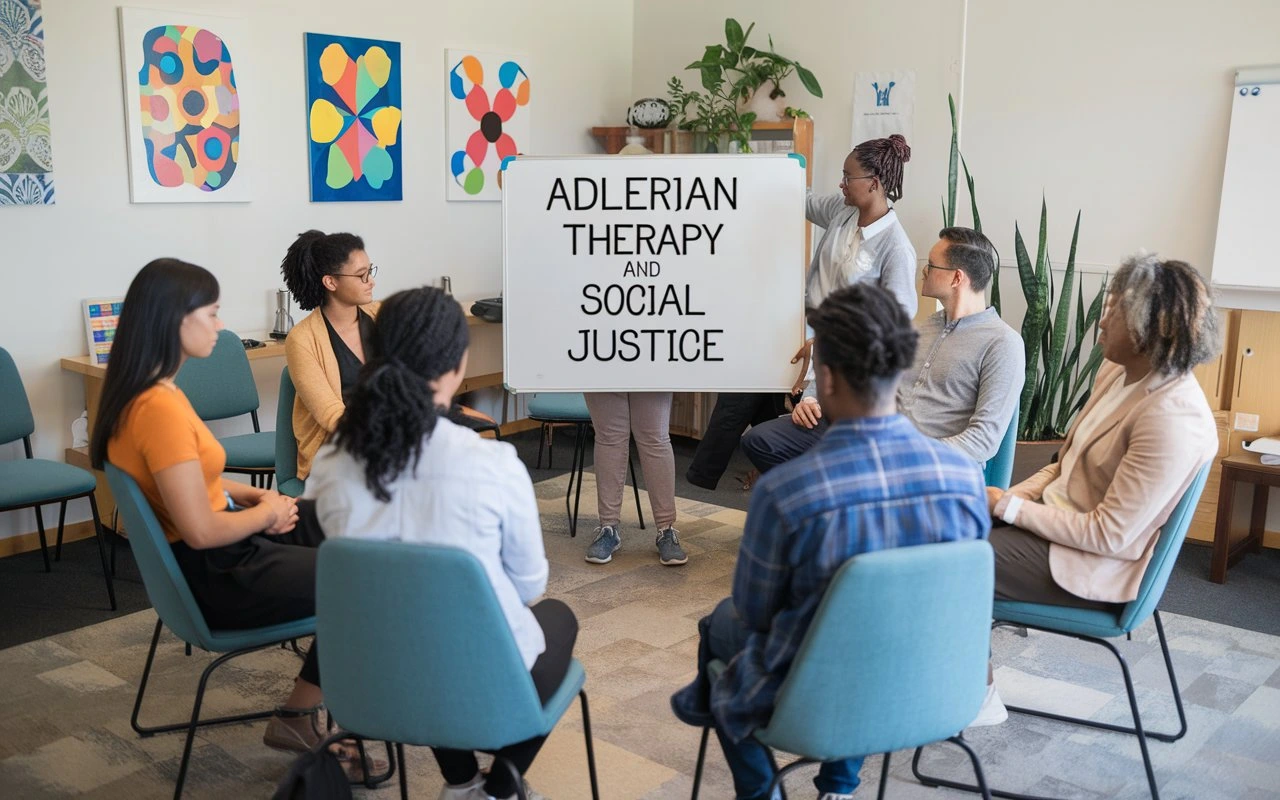Based on Alfred Adler’s ideas, Adlerian therapy stresses how closely people and their communities are interdependent, addressing systemic disparities and promoting human empowerment in alignment with social justice principles.
What is Adlerian Therapy?
Viewed as a comprehensive, goal-oriented method, Adlerian treatment sees people as socially embedded entities. This viewpoint draws attention to:
- Holism: realizing the person as a whole entity rather than as a collection of pieces.
- Social Interest: emphasizing as fundamental to mental well-being community and connections.
- Teleology: Seeing conduct as goal-directed and intentional.
- Encouragement: arming customers to develop self-esteem and overcome inferiority mentality.
To enable a client to create better patterns of thinking and behavior, the therapy process explores their lifestyle, early experiences, and basic beliefs.
The Intersection of Adlerian Therapy and Social Justice
Promoting Equality and Equity
Adlerian therapy’s focus on social interest inherently supports the principles of equality and equity. By emphasizing interconnectedness, therapists can:
- Address systemic barriers affecting marginalized groups.
- Encourage clients to challenge oppressive structures.
- Cultivate a sense of responsibility toward creating inclusive communities.
Addressing Power Dynamics
Power imbalances often contribute to feelings of inferiority. Adlerian therapy helps clients recognize and navigate these dynamics by:
- Identifying societal influences on self-perception.
- Encouraging assertiveness and self-advocacy.
- Challenging internalized biases and stereotypes.
Core Techniques in Adlerian Therapy Supporting Social Justice
Lifestyle Assessment
Lifestyle assessment is a key Adlerian technique. By understanding a client’s worldview, therapists can identify:
- How societal factors shape beliefs and behaviors.
- Patterns that reinforce systemic inequality.
- Possibilities for encouraging adaptability and resilience.
Encouragement
Encouragement empowers clients to overcome personal and social barriers. This approach includes:
- Validating experiences of discrimination.
- Reinforcing the client’s strengths.
- Encouraging active participation in community advocacy.
Socratic Questioning
By asking open-ended questions, therapists help clients:
- Reflect on societal influences.
- Examine the roots of internalized oppression.
- Develop solutions to address inequities.
Applying Adlerian Therapy in Social Justice Initiatives
Education and Awareness
Adlerian ideas let therapists teach groups about systematic inequality. Group therapy sessions, seminars, and workshops help:
- Highlight the importance of social interest.
- Foster empathy and collaboration.
- Encourage proactive social change.
Advocacy and Policy Change
Adlerian practitioners often extend their work beyond individual therapy by engaging in advocacy. This involves:
- Partnering with organizations to address systemic issues.
- Supporting policies that promote mental health equity.
- Empowering clients to become advocates within their communities.
The Role of Cultural Competence
Cultural competence is essential for applying Adlerian therapy effectively in diverse settings. Therapists must:
- Understand cultural contexts and histories of oppression.
- Tailor interventions to respect cultural values.
- Address the unique needs of marginalized populations.
Challenges and Opportunities
Challenges
- Systemic Resistance: Institutions may resist changes that challenge the status quo.
- Client Reluctance: Addressing social justice issues may feel overwhelming for some clients.
- Resource Limitations: Access to therapy and advocacy opportunities may be constrained in under-resourced areas.
Opportunities
- Community Building: Adlerian therapy’s focus on social interest fosters stronger communities.
- Empowerment: Encouragement techniques build resilience and self-efficacy.
- Policy Influence: Advocacy efforts can drive meaningful systemic change.
Read More: I Feel Like a Failure: Understanding the Emotion Through Psychology and How to Cope
Expanding the Scope of Adlerian Therapy
Adlerian therapy’s principles extend beyond individual counseling to broader societal impacts. By addressing systemic challenges, therapists can:
- Foster Collective Action: Encourage group efforts to challenge social inequities.
- Enhance Accessibility: Speak out for mental health treatments in underprivileged areas.
- Promote Holistic Well-being: Combine efforts on social, psychological, and physical wellness.
Integrating Adlerian Practices in Educational Systems
Educational institutions provide a fertile ground for applying Adlerian principles. Administrators, counselors, and teachers may create settings that celebrate diversity and inclusion.
- Using proactive interventions, handle prejudice and bullying.
- Using Adlerian ideas, apply social-emotional learning initiatives.
Collaborative Efforts in Community Advocacy
Adlerian therapy promotes teamwork among legislators, community leaders, and therapists. Together, they can:
- Design programs addressing local social justice issues.
- Provide training for community advocates.
- Evaluate the impact of interventions to ensure sustained progress.
Future Directions for Adlerian Therapy
To remain relevant and impactful, Adlerian therapy must evolve with societal needs. Future priorities include:
- Integrating technology to enhance accessibility.
- Expanding research on its effectiveness in diverse populations.
- Building global networks to promote shared learning and advocacy.
FAQs on Adlerian Therapy and Social Justice
What is Adlerian Therapy?
Viewed as a complete, goal-oriented psychological method, Adlerian treatment sees people as social embedded beings. Fostering mental well-being, it emphasises social interest, personal empowerment, and conquering inferiority complexes.
How does Adlerian therapy promote social justice?
Emphasising connectivity and equality, Adlerian therapy helps clients to remove institutional obstacles, challenge power disparities, and fight for inclusive communities by means of empowerment and self-awareness.
What techniques are used in Adlerian therapy to support social justice?
Core techniques include lifestyle assessment to identify systemic influences, encouragement to empower clients, and Socratic questioning to explore societal impacts and develop actionable solutions.
Can Adlerian therapy address cultural and systemic challenges?
Yes, Adlerian therapy incorporates cultural competence, helping therapists understand diverse contexts and histories of oppression. This allows for tailored interventions that respect cultural values while addressing systemic inequalities.
Where can Adlerian therapy principles be applied outside individual counseling?
Applied in educational institutions, community activism, group therapy, and policy-making, Adlerian therapy ideas can help to solve social justice problems, advance diversity, and foster group well-being.
Conclusion
Adlerian treatment presents a strong structure for handling social as well as personal problems. Its congruence with social justice ideas makes it an important instrument for promoting community well-being, equality, and empowerment. Therapists who combine these techniques help to create a society more fair and equal.











